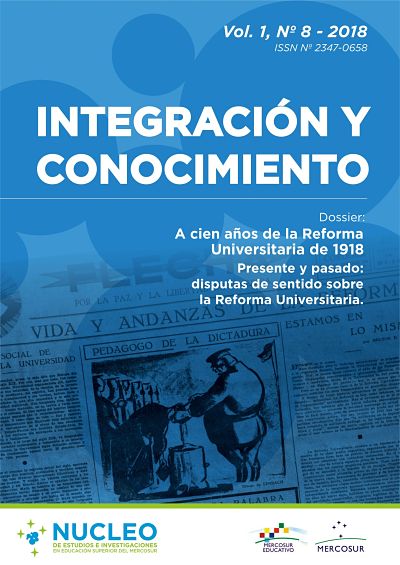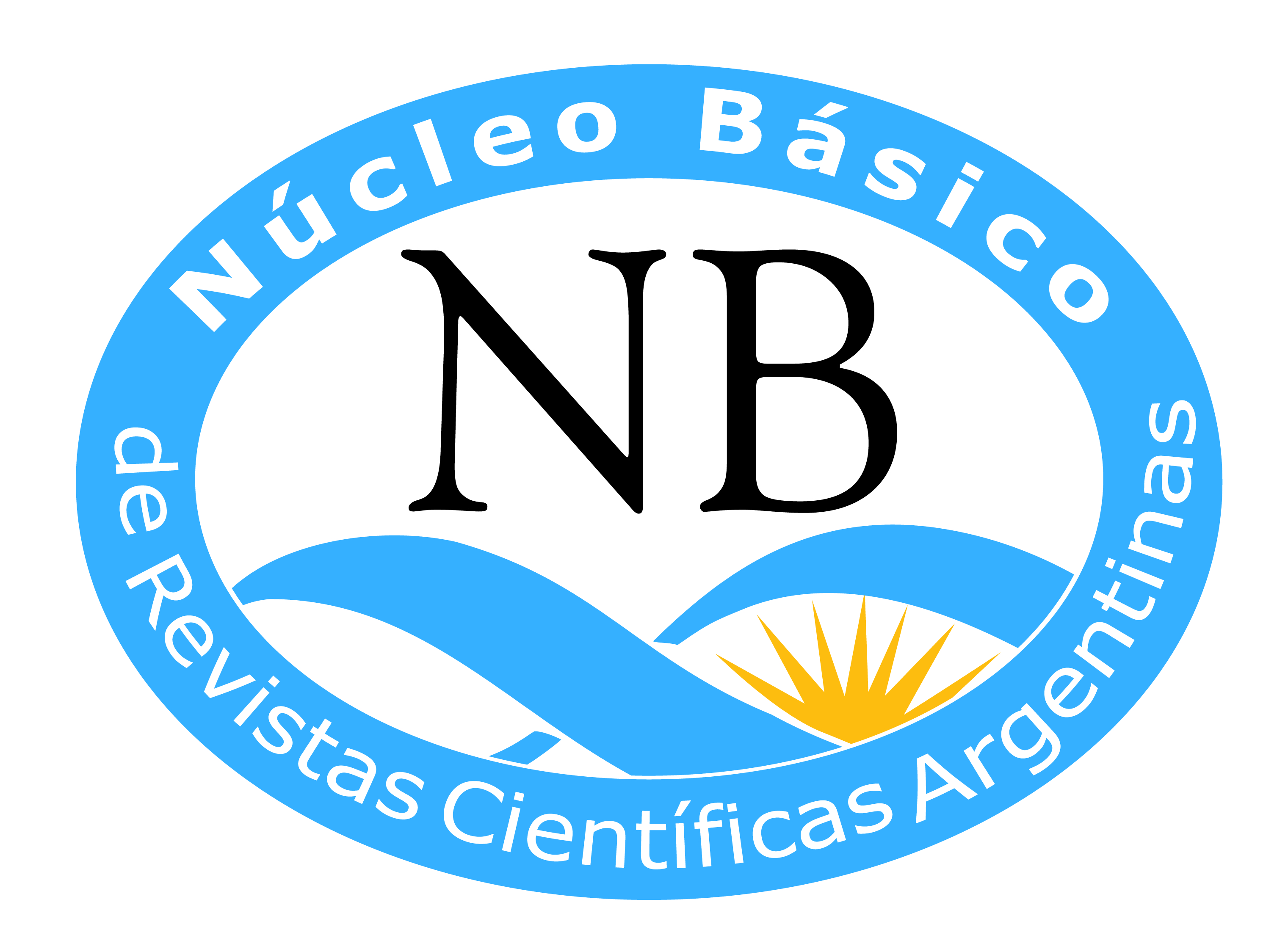De los principios de la Reforma de Córdoba a la Universidad para el Desarrollo de América Latina en el siglo XXI
DOI:
https://doi.org/10.61203/2347-0658.v7.n1.20105Palavras-chave:
Universidad, Desigualdad, Subdesarrollo, Desarrollo, Democratización del conocimientoResumo
La desigualdad tiende a crecer en el mundo de hoy y el subdesarrollo persiste. Las orientaciones prevalecientes en la generación y el uso del conocimiento científico y tecnológico figuran entre las causas mayores de ambos fenómenos. Tales orientaciones reflejan en gran medida relaciones de poder que involucran a diversos actores, entre los cuales las universidades tienen o pueden llegar a tener un papel relevante. Por ello, a escala internacional, se ahondan las disputas por la orientación de las instituciones de Educación Superior. El modelo dominante de ayer, la llamada “universidad humboldtiana”, ha sido reemplazado por el de la “universidad empresarial”. Si el primer modelo no cuestiona el subdesarrollo ni la desigualdad basada en el conocimiento, el segundo los acentúa. La idea de Universidad socialmente comprometida, alumbrada por el Movimiento Latinoamericano de la Reforma Universitaria, lleva a pensar en una alternativa distinta, que aquí se describe como “universidad para el desarrollo”. La caracteriza su vocación por colaborar con variados actores sociales en diversas tareas orientadas a la democratización del conocimiento, meta que seguramente compartirían los firmantes del Manifiesto de Córdoba.
Downloads
Referências
Altbach, P. (Ed.). (2003). The Decline of the Guru. The Academic Profession in the Third World. NewYork: Palgrave Macmillan.
Arocena, R., Göransso, B & Sutz, J. (2018). Developmental Universities in Inclusive Innovation Systems. Alternatives for Knowledge Democratization in the Global South. New York: Palgrave Mcmillan.
Altbach, P., Reisberg, L., & Rumbley, L. (2009). Trends in Global Higher Education: Tracking an Academic Revolution. París: UNESCO.
Benner, M. (2011). In Search of Excellence? An International Perspective on Governance of University Research. In B. Göransson & C.Brundenius (Eds.), Universities in Transition. The Changing Role and Challenges for Academic Institutions (pp. 11–24). Ottawa: Springer.
Benneworth, P. (2013). University Engagement with Socially Excluded Communities. Towards the Idea of ‘the Engaged University’. In P. Benneworth (Ed.), University Engagement with Socially Excluded Communities (pp. 3–31). Netherlands: Springer.
Bértola, L. y Ocampo, J. A. (2013). El desarrollo económico de América Latina desde la Independencia. México: FCE.
Brennan, J., & Naidoo, R. (2008). Higher Education and the Achievement (and/or Prevention) of Equity and Social Justice. Higher Education, 3(56) Nº3, 287–302.
Brynjolfsson, E., & McAfee, A. (2014). The Second Machine Age. Work, Progress, and Prosperity in a Time of Brilliant Technologies. New York: Norton and Co.
CEPAL - UNESCO (1992). Educación y conocimiento: eje de la transformación productiva con equidad. Santiago de Chile.
Clark, B. (1995). Places of Inquiry: Research and Advanced Education in Modern Universities. Berkeley: The California University Press.
Clark, B. (1997). The Modern Integration of Research Activities with Teaching and Learning. The Journal of Higher Education, 3(68), 241–255.
Doner, R., & Schneider, B. R. (2016). The Middle-Income Trap: More Politics than Economics. World Politics, 4, 608–644.
Etzkowitz, H. (2004). The Evolution of the Entrepreneurial University. International Journal of Technology and Globalization, 1(1), 64–77.
Fajnzylber, F. (1984). La industrialización trunca de América Latina, Buenos Aires: Centro Editor de América Latina.
Goddard, J.; Hazelkorn, E.; Kempton, L. and Vallance, P. (Edit.). (2016). The Civic University The Policy and Leadership Challenges. Cheltenham: Edward Elgar.
Gregersen, B., & Rasmussen, G. (2011). Developing Universities: The Evolving Role of Academic Institutions in Denmark. In B. Göransson & C. Brundenius (Eds.), Universities in Transition. The Changing Role and Challenges for Academic Institutions (pp. 283–306). Ottawa: Springer.
Gregersen, B. (2017). Role of Universities for Inclusive Development and Social Innovation: Experiences from Denmark. In C. Brundenius, B. Göransson, & J. M. Carvalho de Mello (Eds.), Universities, Inclusive Development and Social Innovation. An International Perspective (pp. 369–386). Ottawa: Springer.
Halperin, T. (1996). Historia contemporánea de América Latina. Madrid: Alianza.
Lundvall, B.-Å., & Johnson, B. (1994). The Learning Economy. Industry and Innovation, 2(1), 23–42.
Lundvall, B. Å. (2010). Postcript: Innovation System Research – Where It Comes from and Where It Might Go. In B. A. Lundvalll (Ed.), National Systems of Innovation. Towards a Theory of Innovation and Interactive Learning (pp. 317–366). London: Anthem Press.
Milanovi?, B. (2016). Global Inequality: A New Approach for the Age of Globalization. Cambridge, MA: Harvard University Press.
Nowotny, H., Scott, P., & Gibbons, M. (2001). Re-thinking Science. Knowledge and the Public in an Age of Uncertainty. Cambridge, UK: Polity Press.
Piketty, T. (2014). Capital in the XXI Century. Cambridge, MA: Harvard University Press.
Rhoades, G., Maldonado, A., Ordorika, I., & Velázques, M. (2004). Imagining Alternatives to Global, Corporate, New Economy Academic Capitalism. Policy Futures in Education, 2(2), 316–329.
Roper, C. D., & Hirth, M. A. (2005). A History of Change in the Third Mission of Higher Education: The Evolution of One-Way Service to Interactive Engagement. Journal of Higher Education Outreach and Engagement, 3(10), 3–21.
Sabato, J. (Ed.). (1975). El pensamiento latinoamericano en la problemática ciencia – tecnología – desarrollo – dependencia. Buenos Aires: Editorial PAIDOS.
Sabato, J., & Botana, N. (1968). La ciencia y la tecnología en el desarrollo futuro de América Latina. Revista de la Integración, 3(1), 15-36.
Scheidel, Walter (2017). The Great Leveler. Violence and the History of Inequality from the Stone Age to the Twenty-First Century. Princeton: Princeton University Press.
Schwartzman, S. (2008). Introducción. Educación Superior, Investigación Científica e Innovación en América Latina. En S. Schwartzman (Ed.), Universidad y desarrollo en Latinoamérica: experiencias exitosas de centros de investigación (pp. 1–25). Bogotá: IESALC-UNESCO.
Sutz, J. (2005, April). The Role of Universities in Knowledge Production. SciDevNet, Policy Briefs. Available at: http://www.scidev.net/global/policybrief/the-role-of-universities-in-knowledge-production-.html.
Tilly, C. (2005). Identities, Boundaries, and Social Ties. Boulder: Paradigm Publishers.
Weerts, D. J., & Sandmann, L. R. (2008). Building a Two-Way Street: Challenges and Opportunities for Community Engagement at Research Universities. Review of Higher Education, 1(32), 73–106.
Downloads
Publicado
Edição
Seção
Licença
Os autores que publicaram com esta revista aceitam os seguintes termos:
a. Os autores devem manter seus direitos autorais e garantir à revista o direito de primeira publicação de seu trabalho, que estará simultaneamente sujeito à Licença Creative Commons de Reconhecimento que permite que terceiros compartilhem o trabalho, desde que seu autor seja indicado e sua primeira publicação seja esta revista.
b. Os autores podem adotar outros acordos de licenciamento não exclusivos para a distribuição da versão publicada da obra (por exemplo, depositando-a em arquivo telemático institucional ou publicando-a em volume monográfico), desde que seja indicada a publicação inicial nesta revista.
c. Os autores são autorizados e incentivados a divulgar os seus trabalhos através da Internet (por exemplo, em arquivos telemáticos institucionais ou no seu sítio Web) após a publicação do artigo, o que pode levar a intercâmbios interessantes e a citações acrescidas dos trabalhos publicados. (Ver O Efeito do Acesso Aberto).



